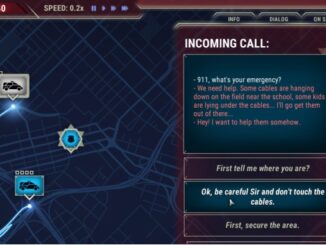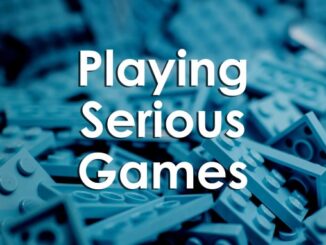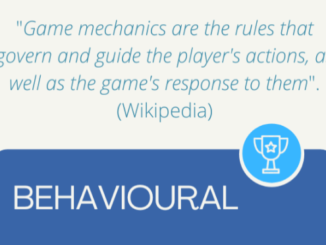
I’ve wanted to learn the bass guitar ever since I saw Ashish Vyas from Thievery Corporation bust out the mesmerising bassline from Lebanese Blonde. As a passionate advocate for game-based learning what better way to learn to play than with a game?
Enter Rocksmith!
Rocksmith is a game which claims to be “the fastest way to learn guitar”.
Load up the game, plug your guitar into your computer and play a song. The game detects the notes you play, and when you play them. It then gives you feedback to help you learn and improve your performance.
Amazing concept right?
I found playing Rocksmith to be an incredible learning experience, particularly as a beginner. There is a lot of inspiration to take from Rocksmith on how to make learning more fun and engaging. Here are two insights along with one caution/consideration!
Let’s start with a couple of areas where Rocksmith rocks.
Adapts to the Learners Skill Level
What makes someone feel like a rockstar? Help them feel like they are smashing out their favourite songs as soon as possible.

Rocksmith has a feature called ‘Dynamic Difficulty’. The difficulty of a song adjusts based on how well you are playing it. When you start out a new song, you are only given 10-20% of the notes to play. As you get better the game adds in additional notes. It also removes notes or segments you find tricky. There are elements of scaffolding at play here too, including built-in videos and mini-games to learn more complex skills. ‘Dynamic Difficulty’ works a treat at creating engagement, even though there are some issues about developing bad habits (which I’ll cover later)
Why ‘Dynamic Difficulty’ creates engagement? Flow Theory

The elegant model from Csíkszentmihályi shows when you get the match between challenge and skill right you can enter a flow state. It’s a beautiful place to be, where you become “completely involved in an activity for its own sake.”
Because the challenge in the game frequently adapts to meet your skill level it creates lots of moments of flow. Whilst I haven’t (yet) mastered playing ‘Seven Nation Army‘, I could start playing parts of the incredibly distinctive and catchy riff pretty quickly. And you know what? That feels great and that creates a motivating effect to continue to improve.
Insight: How can you create more moments of flow for your learners?
We’ve all been there as facilitators. When some of the group are going blazing fast, and others are finding things tricky or prefer going slower. This causes problems for both parties. The ‘faster’ group start getting bored, distracted, checking e-mails. The ‘slower’ group feel the pressure to keep up and can feel less adequate. It’s a lose/lose. Whilst it’s fairly common practice to flex difficulty at the program/workshop level, how can you go beyond this and better flex challenge within your programs/workshops to suit the diversity of every learner you work with?
If you can find ways to create ‘Dynamic Difficulty within your programs, you’ll create more moments of flow. And that’s good for building learners confidence to apply learning back in the real world.
? Make Practice Rewarding for Learners
How do you really become a rockstar? Practice. Lots of practice.
But for most people practising the same songs and notes over and over again can get pretty tedious.
Rocksmith has two clever features to help overcome this problem. Firstly it gives you a mastery score for every song you’ve played. You only need to improve your mastery by .1% to feel like your practice is making a difference and you are improving. And this keeps you playing the same songs over, and over, and over again. It’s a great feedback loop!
And when you get stuck on a tricky segment or can’t improve your mastery score? ‘Riff Repeater’ is here to help. ‘Riff Repeater’ allows you to isolate individual segments you are struggling with, it then allows you to slow those segments right down, and repeat until you’ve mastered them, before gradually ramping up the speed.

When I hit 100%+ mastery on La Sera – Love That’s Gone, (which has a lovely, melodic, yet simple bassline), I got a tremendous sense of satisfaction which immediately made me want to get 100% on another song.
Why is creating a sense of progress and mastery is so important? The Progress Principle
Professor Teresa Amabile and Steven Kramer wrote about “The Progress Principle” in their book, which is also summarised very well in their HBR article “The Power of Small Wins“. The essence of the principle is that making progress, however small, can increase people’s motivation and happiness.
Couple this together with the universal need people have to improve and attain mastery over tasks (Self Determination Theory, Deci & Ryan) and you can see how giving learners visible signs of progress that relate to their mastery is so powerful.
Insight: How can you create a better sense of progress for your learners?
Most people find it challenging to practice new skills back in the workplace, outside of the training environment. Part of the issue is that practising in the workplace feels high-risk for most people. People don’t like messing up and feeling foolish in front of their team members. And this is why creating psychological safety is so important. If there is a high level of psychological safety within your team/company, then people are going to be more willing to try something new, take a risk and be okay with messing up.
From a learning design perspective, this is where it’s essential to think about the whole learning experience and not just the workshop. And this is where many learning programs fall short in my opinion. There usually isn’t enough opportunities following a workshop for learners to repeat and practice their skills. The AGES model by the Neuroldership Institute covers off the key principles for effective long-term learning. Here are some examples of how you can easily build in more practice and a sense of progress in your learning programs:
- Take one of the activities used as part of of a workshop, and repeat it again at a team meeting
- Schedule in micro sessions which are just about creating safe spaces to practice and try out new skills, rather than learn and new theory or concepts
- Set skills-based challenges every week/fortnight which require learners to apply the concepts they’ve been learning about. Start these off nice and easy and incrementally make them more challenging.
? How Rocksmith Hits the Wrong Notes: Picking Up Bad Habits
“I guess I got a bad habit, and it ain’t goin’ away, yeah”
Whilst the game gives you tons of feedback, this feedback is focused on if you hit the notes at the right time, not how you do it. So it looks at the outcome, not the process. And when learning something new, the process is the most important thing to really focus on.
I may be hitting all the right notes and the right time, but it can still sound bad (and from experience it does!). The game tries to get around this with in-built lessons. But in reality, I have picked up poor techniques from self-teaching, especially in search of trying to get a higher score.
And whilst ‘Dynamic Difficulty’ is generally well implemented, sometimes you pick up bad habits to learn the easy sequence, habits which are hard to unlearn when you need to play the harder sequence. Some point soon I will need to get a teacher/coach to help me focus on technique and take my performance to the next level.
Consideration: How do you support self-paced training with coaching, mentoring and peer support?

With the continued rise in the demand for self-paced learning, companies need to carefully consider how they integrate coaching or mentoring support into the learning experience. This is to help with learning transfer, but also to make sure people don’t pick up ‘bad habits’ through misinterpretation or misunderstanding.
Similarly pairing self-paced learning with some group-based coaching can help amplify the online self-paced learning experience. Firstly it provides a great space for people to discuss the materials they are learning. And secondly, it adds a layer of peer accountability to the process which can be useful to drive completion and application of learning.
Make Your Learners Feel Like Rockstars
I’ve really enjoyed taking my bass guitar ability from nil to beginner. And a large part of that is due to Rocksmith making me feel like I could play and that I wasn’t completely incompetent.
The other beautiful gift Rocksmith has given me is the discovery of tons of new music and genres I ordinary wouldn’t have known about or thought of playing. By playing Rocksmith I have developed a love for Garage Rock and Blues Rock (go The Strokes and Black Keys). This is actually remarkable given my very narrow taste in music pre-Rocksmith!
- How to Make Your Learners Feel Like Rockstars - 13th July 2021





Be the first to comment